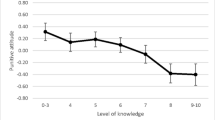Abstract
Lay judges’ decision-making process in the determination of appropriate punishment appears to be based on their assessment of the seriousness of the crime; this indicates that legal sentences are being decided subjectively, which can be problematic. For instance, judgments can sometimes be made on the basis of irrelevant and therefore improper, information. Ideally, such information would be disregarded when considering appropriate punishment in a real court. Thus, the aim of this study was to determine whether information that is irrelevant to a criminal case can influence Japanese lay judges’ determination of an appropriate punishment. Our study used a fictional case study and a questionnaire to assess whether Japanese participants were influenced by exposure to irrelevant information. The results of two experiments consistently showed that irrelevant information distorts the inner subjective balance between the severity of punishment and the seriousness of the crime and may even influence the decision-making process that lay judges engage in when determining offenders’ punishment. We suggest reasons why this influence might affect decision-making and discuss whether the influence of improper information can be consciously disregarded.


Similar content being viewed by others
References
Alter, A. L., Kernochan, J., & Darley, J. M. (2007). Transgression wrongfulness outweighs its harmfulness as a determinant of sentence severity. Law and Human Behavior, 31, 319–335.
Bornstein, B. H. (1994). David, Goliath, and Reverend Bayes: prior beliefs about defendants’ status in personal injury cases. Applied Cognitive Psychology, 8, 233–258.
Bornstein, B. (1999). The ecological validity of jury simulations: is the jury still out? Law and Human Behavior, 23, 75–91.
Carlsmith, K. M. (2006). The roles of retribution and utility in determining punishment. Journal of Experimental Social Psychology, 42, 437–451.
Carlsmith, K. M., Darley, J. M., & Robinson, P. H. (2002). Why do we punish? Deterrence and just deserts as motives for punishment. Journal of Personality and Social Psychology, 83, 284–299.
Cather, C., Greene, E., & Durham, R. (1996). Plaintiff injury and defendant reprehensibility: implications for compensatory and punitive damages. Law and Human Behavior, 20, 189–205.
Chaiken, S., & Maheswaran, D. (1994). Heuristic processing can bias systematic processing: effects of source credibility, argument ambiguity, and task importance on attitude judgment. Journal of Personality and Social Psychology, 66(3), 460.
Darley, J. M., Carlsmith, K. M., & Robinson, P. H. (2000). Incapacitation and just deserts as motives for punishment. Law and Human Behavior, 24, 659–683.
Erickson, M. L., & Gibbs, J. P. (1979). On the perceived severity of legal penalties. The Journal of Criminal Law and Criminology, 70, 102–116.
Greene, E., Johns, M., & Bowman, J. (1999). The effects of injury severity on jury negligence decisions. Law and Human Behavior, 23, 675–693.
Hammitt, J. K., Carroll, S. J., & Relles, D. A. (1985). Tort standards and jury decisions. The Journal of Legal Studies, 14, 751–762.
Hans, V. P., & Ermann, M. D. (1989). Responses to corporate versus individual wrongdoing. Law and Human Behavior, 13, 151–166.
Harley, E. M. (2007). Hindsight bias in legal decision-making. Social Cognition, 25, 48–63.
Hastie, R., Schkade, D. A., & Payne, J. W. (1999). Juror judgments in civil cases: hindsight effects on judgments of liability for punitive damages. Law and Human Behavior, 23, 597–614.
Igou, E., & Bless, H. (2005). The conversational basis for the dilution effect. Journal of Language and Social Psychology, 24, 25–35.
Kolber, A. J. (2009). The comparative nature of punishment. Boston University Law Review, 89, 1565–1608.
Nisbett, R. E., & Wilson, T. D. (1977). Telling more than we can know: verbal reports on mental processes. Psychological Review, 84, 231–259.
Nisbett, R. E., Zukier, H., & Lemley, R. E. (1981). The dilution effect: nondiagnostic information weakens the implications of diagnostic information. Cognitive Psychology, 13, 248–277.
Penrod, S. D., & Cutler, B. L. (1995). Witness confidence and witness accuracy: assessing their forensic relation. Psychology, Public Policy, and Law, 1, 817–845.
Robbennolt, J. (2002). Punitive damage decision-making: the decisions of citizens and trial court judges. Law and Human Behavior, 26, 315–341.
Rossi, P. H., Waite, E., Bose, C. E., & Berk, R. E. (1974). The seriousness of crimes: normative structure and individual differences. American Sociological Review, 39, 224–237.
Schwarz, N., & Clore, G. L. (1983). Mood, misattribution and judgement of well-being: informative and directive functions of affective states. Journal of Personality and Social Psychology, 45, 513–523.
Smith, A. C., & Greene, E. (2005). Conduct and its consequences: attempts at debiasing jury judgments. Law and Human Behavior, 29, 505–526.
Sporer, S. L., & Goodman-Delahunty, J. (2009). Disparities in sentencing decisions. Social psychology of punishment of crime. In M. E. Oswald, S. Bieneck, & J. Hupfeld-Heinemann (eds.), Social psychology of punishment of crime (pp. 379–401). New York: Wiley.
Warr, M. (1989). What is the perceived seriousness of crimes? Criminology, 27, 795–821.
Warr, M., Meier, R. F., & Erickson, M. L. (1983). Norms, theories of punishment, and publicly preferred penalties for crimes. The Sociological Quarterly, 24, 75–91.
Wells, G. L., & Quinlivan, D. S. (2009). The eyewitness post–identification feedback effect: what is the function of flexible confidence estimates for autobiographical events? Applied Cognitive Psychology, 23, 1153–1163.
Wrightsman, L. S. (1999). Judicial decision-making: is psychology relevant? New York: Kluwer/Plenum Publishers.
Zukier, H. (1982). The dilution effect: the role of correlation and the dispersion of predictor variables in the use of nondiagnostic information. Journal of Personality and Social Psychology, 43, 1163–1174.
Acknowledgments
This research was supported in part by grants from the Japan Society for the Promotion of Science (grant number: 21 9821).
Author information
Authors and Affiliations
Corresponding author
Rights and permissions
About this article
Cite this article
Watamura, E., Wakebe, T. & Karasawa, K. The Influence of Improper Information on Japanese Lay Judges’ Determination of Punishment. Asian Criminology 9, 285–300 (2014). https://doi.org/10.1007/s11417-014-9193-7
Received:
Accepted:
Published:
Issue Date:
DOI: https://doi.org/10.1007/s11417-014-9193-7




